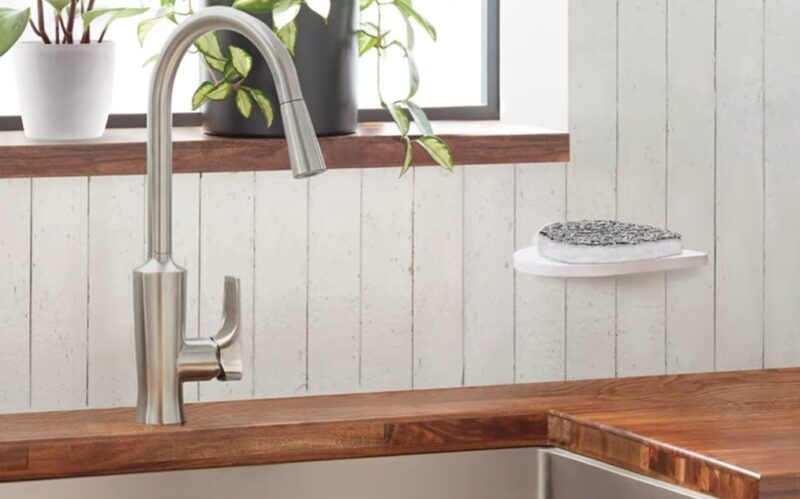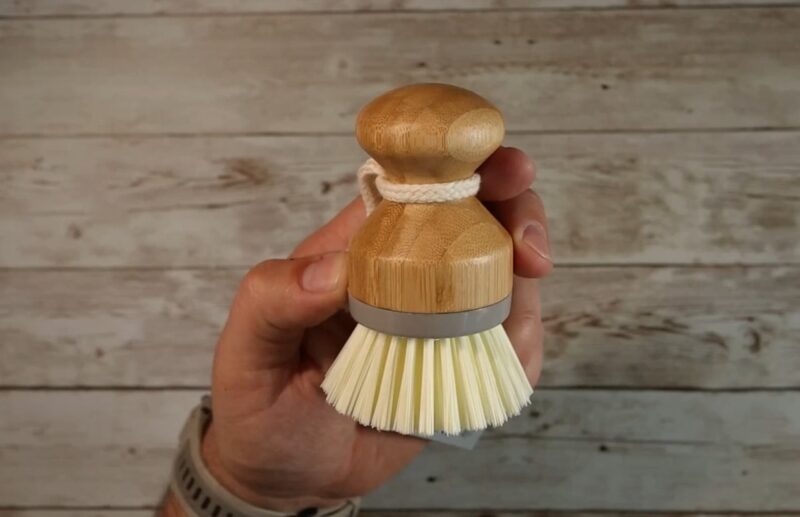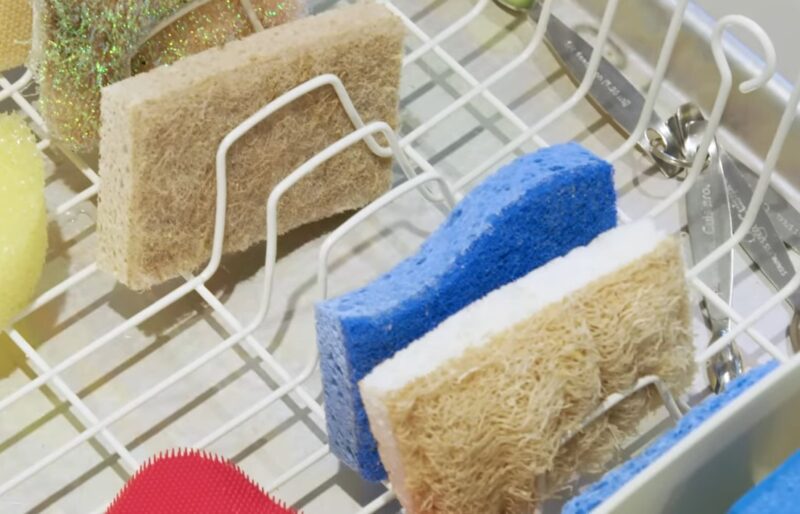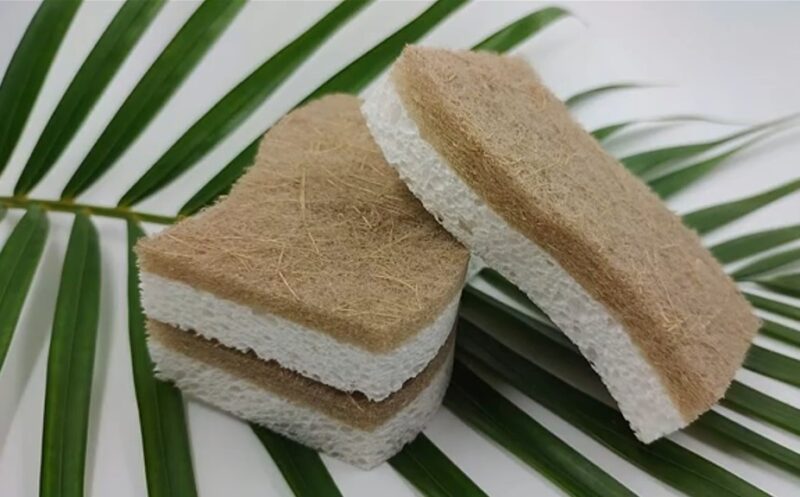As a conscious consumer, I am always looking for ways to reduce plastic waste and make sustainable choices in my everyday life. One area that often gets overlooked is our kitchen sponges. Did you know that traditional sponges contribute to pollution and end up in landfills due to their non-biodegradable nature? That’s why I have been on a mission to find eco-friendly kitchen sponges that are not only effective but also environmentally friendly alternatives.
By opting for eco-friendly kitchen sponges, we can help protect the planet and promote sustainable living. These sponges are made from natural materials and are compostable, meaning they break down and reduce plastic waste.
So, if you’re ready to make a positive change in your kitchen cleaning routine and become a conscious consumer, keep reading to discover eco-friendly kitchen sponges you didn’t know existed.
Key Takeaways:
- Helping the planet by choosing eco-friendly kitchen sponges
- Sustainable living through conscious consumerism
- Reducing plastic waste with environmentally friendly alternatives
The Problem with Traditional Kitchen Sponges

When it comes to dish sponges, many people are unaware of the significant environmental impact they have. Traditional kitchen sponges, especially those in green and yellow, are made of synthetic fibers that contribute to plastic waste and pollution. These sponges do not biodegrade, taking hundreds of years to decompose and releasing harmful microfibers into the environment. Additionally, natural sponges derived from sea creatures have been overfished, leading to the development of synthetic alternatives.
To address these concerns, biodegradable sponges have been introduced as a solution. Made from natural materials, these sponges break down quickly in landfill sites, reducing their environmental impact. By opting for these biodegradable options, we can significantly minimize plastic waste and promote sustainable living.
“Traditional kitchen sponges are not only harmful to the environment but also to our oceans and marine life. Their non-biodegradable nature and microfiber release pose a serious threat to the delicate ecosystems. It is essential that we switch to more sustainable alternatives to protect our planet and embrace responsible consumer choices.” – Environmental expert
Comparative Analysis ─ Traditional Sponges vs. Biodegradable Sponges
| Aspect | Traditional Sponges | Biodegradable Sponges |
|---|---|---|
| Environmental Impact | Contribute to plastic waste and pollution | Break down quickly, reducing plastic waste |
| Decomposition Time | Can take hundreds of years | Break down within a short period |
| Material Source | Synthetic fibers, overfished natural sponges | Natural materials from sustainable sources |
The comparative analysis above clearly demonstrates the advantages of biodegradable sponges over their traditional counterparts. By choosing biodegradable options, we can make a positive impact on the environment and contribute to a more sustainable future.
Compostable and Plant-Based Sponges
If you’re looking for a plastic-free and sustainable choice for your kitchen cleaning needs, compostable and plant-based sponges are a great option. These sponges are made from plant-based ingredients and are designed to be biodegradable, making them an eco-friendly alternative to traditional kitchen sponges.
One popular choice is the Plantish Pop-up Sponge Collection. These sponges are made from natural materials like cellulose and are free from plastic waste. They are highly absorbent and durable, allowing for effective cleaning of tough stains and grime. When it’s time to dispose of them, you can simply compost them, reducing your environmental impact.
Another option is the Compostable Cellulose Sponge – Eco-Sal. This sponge is made from biodegradable cellulose fibers and does not contain any plastic. It is a sustainable choice for your kitchen cleaning routine and can be used for various tasks, from washing dishes to wiping countertops.
Comparing Compostable and Plant-Based Sponges
| Feature | Plantish Pop-up Sponge Collection | Compostable Cellulose Sponge – Eco-Sal |
|---|---|---|
| Material | Cellulose | Cellulose |
| Plastic-free | Yes | Yes |
| Biodegradable | Yes | Yes |
| Absorbency | High | High |
| Durability | Durable | Durable |
| Usage | Various kitchen tasks | Dishwashing, countertop cleaning |
“Compostable and plant-based sponges are a sustainable and effective choice for cleaning tasks in the kitchen. Their biodegradable nature and use of natural materials make them a plastic-free alternative to traditional sponges.” – EcoLiving Magazine.
By choosing compostable and plant-based sponges, you are making a conscious decision to reduce plastic waste and support sustainable living. These sponges not only provide effective cleaning results but also contribute to a healthier planet.
Sustainable Cloth Alternatives to Sponges
When it comes to sustainable alternatives to traditional kitchen sponges, reusable dishcloths are an excellent choice. These cloths, such as the Full Circle Tidy Organic Cotton Dish Cloths and the Ecologie by Danica – Avocado Reusable Swedish Dishcloth, are made from organic cotton, making them eco-friendly and gentle on surfaces. They are designed to be long-lasting, providing a sustainable option for your cleaning needs.
The Full Circle Tidy Organic Cotton Dish Cloths are made from 100% organic cotton and feature a textured surface that helps to tackle tough stains and grime. These dishcloths are reusable, machine washable, and highly absorbent, offering a convenient and effective alternative to traditional sponges. They are also available in a variety of colors and patterns, adding a touch of style to your kitchen.
The Ecologie by Danica – Avocado Reusable Swedish Dishcloth is another great sustainable cloth alternative. Made from a blend of cellulose and cotton, these dishcloths are biodegradable and compostable. They are designed to replace single-use paper towels and can absorb up to 20 times their weight in liquid. With their vibrant avocado design, these dishcloths are not only practical but also add a fun element to your kitchen decor.
Table: Comparison of Sustainable Cloth Alternatives
| Sustainable Cloth Alternative | Material | Key Features |
|---|---|---|
| Full Circle Tidy Organic Cotton Dish Cloths | 100% organic cotton | Textured surface, reusable, machine washable, highly absorbent |
| Ecologie by Danica – Avocado Reusable Swedish Dishcloth | Cellulose and cotton blend | Biodegradable, compostable, absorbent, replaces single-use paper towels |
For those looking for a non-scratch option, the Skoy Scrub Non-Scratching is an excellent choice. Made from 100% cotton fibers with a non-toxic hardener, these scrub pads are safe to use on a variety of surfaces, including non-stick cookware and delicate dishes. They are long-lasting and can be cleaned in the dishwasher or washing machine, offering a sustainable and convenient alternative to traditional sponges.
By choosing sustainable cloth alternatives like reusable dishcloths and non-scratch scrub pads, you can reduce your environmental impact and contribute to a more sustainable future. These eco-friendly options are not only effective at cleaning but also promote conscious consumerism, allowing you to make a positive change in your everyday life.
Eco-Friendly Sponge Alternatives

When it comes to finding eco-friendly alternatives to traditional kitchen sponges, there are a variety of options available that can help reduce plastic waste and promote sustainable living. One such alternative is the Bamboo Dish Brush. Made with natural materials, this durable brush is designed for long-term use and offers an environmentally friendly way to clean dishes and surfaces in the kitchen.
Another eco-friendly option is the SodaStream. By allowing you to make your own sparkling water at home, the SodaStream helps eliminate the need for single-use plastic bottles. By opting for this sustainable solution, you can reduce your carbon footprint and contribute to a cleaner, healthier planet.
For those looking for a more sustainable way to store food, Bee’s Wrap offers an excellent alternative to plastic wrap. Made from organic cotton infused with beeswax, jojoba oil, and tree resin, Bee’s Wrap is a reusable and biodegradable option that can be used to wrap sandwiches, cover bowls, or store leftovers. Not only does it help reduce plastic waste, but it also keeps your food fresh and protected.
Table: Comparing Eco-Friendly Sponge Alternatives
| Bamboo Dish Brush | SodaStream | Bee’s Wrap | |
|---|---|---|---|
| Material | Bamboo and natural fibers | N/A | Organic cotton, beeswax, jojoba oil, and tree resin |
| Usage | Cleaning dishes and surfaces | Making sparkling water at home | Storing food and leftovers |
| Sustainability | Biodegradable and made from renewable resources | Reduces single-use plastic bottles | Reusable and biodegradable alternative to plastic wrap |
By considering these eco-friendly sponge alternatives, you can make a positive impact on the planet while still maintaining effective cleaning practices in your kitchen. Whether you choose the Bamboo Dish Brush, the SodaStream, or Bee’s Wrap, each option offers a sustainable solution that aligns with the principles of conscious consumerism and sustainable living.
Conclusion
In conclusion, making the switch to eco-friendly kitchen sponges and other sustainable kitchen products is a simple yet impactful way to contribute to reducing plastic waste and promoting sustainable living. By opting for biodegradable and reusable alternatives, we can make a positive difference for the planet while maintaining effective cleaning practices in the kitchen.
Choosing compostable and plant-based sponges, such as the Plantish Pop-up Sponge Collection and the Compostable Cellulose Sponge – Eco-Sal, allows us to avoid plastic waste and rely on natural materials that break down quickly in landfill sites. These sponges are durable, absorbent, and provide an eco-friendly solution for all our cleaning needs.
Additionally, sustainable cloth alternatives like the Full Circle Tidy Organic Cotton Dish Cloths and the Ecologie by Danica – Avocado Reusable Swedish Dishcloth offer a long-lasting and gentle option for cleaning surfaces. The Skoy Scrub Non-Scratching, made of 100% cotton fibers with a non-toxic hardener, ensures effective cleaning without causing any scratches.
Furthermore, there are various eco-friendly sponge alternatives available, such as the Eco Roots- Plastic-Free Wooden Dish Brush, which is made with natural materials and designed to be durable for long-term use. The SodaStream enables us to create our own sparkling water at home, reducing the consumption of single-use plastic bottles. Bee’s Wrap provides a sustainable alternative to plastic wrap using organic cotton infused with beeswax, jojoba oil, and tree resin.

FAQ
Are traditional kitchen sponges harmful to the environment?
Yes, traditional kitchen sponges are harmful to the environment due to their short lifespan and non-biodegradable nature. They contribute to pollution and end up in landfills, taking hundreds of years to decompose.
What are compostable and plant-based sponges?
Compostable and plant-based sponges are eco-friendly alternatives to traditional sponges. They are made from natural materials and break down quickly in landfill sites, reducing plastic waste and promoting conscious consumerism.
What are sustainable cloth alternatives to sponges?
Sustainable cloth alternatives include reusable dishcloths made from organic cotton and gentle on surfaces. Another option is the Skoy Scrub Non-Scratching, a 100% cotton fiber scrubber that provides effective cleaning without scratching.
What are some eco-friendly sponge alternatives?
Eco-friendly sponge alternatives include the Eco Roots- Plastic-Free Wooden Dish Brush, the SodaStream for making your own sparkling water at home, and Bee’s Wrap, a sustainable alternative to plastic wrap.
How do eco-friendly kitchen sponges help reduce plastic waste?
By choosing biodegradable and reusable alternatives, such as eco-friendly kitchen sponges, we can make a positive impact on the planet and reduce plastic waste. They are a simple step towards living a more environmentally conscious lifestyle.

